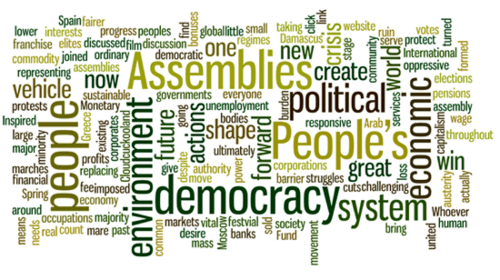Report from London 22 June, 2013 by Respect For the Unemployed & Benefit Claimants:
Unemployed activists, disabled campaigners and trade unions warned today of a co-ordinated action against the Government’s spending cuts. Thousands of activists gathered to highlight the impact of the coalition’s controversial austerity measures. The People’s Assembly brought together the unemployed, unions, politicians and campaign groups amid complaints that minsters were “deaf” to the concerns of ordinary people.
Respect For the Unemployed and Benefit Claimants warned:
Today’s People’s Assembly cannot be a one-off rally that brings people together in anger but without focus and practical results. It must serve as the first step towards a broad-based movement that joins communities and established organised forces around a new economic programme to put ordinary people, not the forces of capital, in the driving seat.
Civil disobedience, direct action, protest, and coordinated mass strike action—all will be part of the arsenal. But without clear, achievable goals based around the kind of society we desire such efforts will remain isolated gestures of resistance.
More than 4,000 people packed into the Methodist Central Hall Westminster, cheering speeches from union leaders including Len McCluskey of Unite the Union, Mark Serwotka of the Public and Commercial Services Union, Christine Blower of the National Union of Teachers, politicians including Green Party MP Caroline Lucas, and officials from a number of protest and campaign groups. McCluskey said the UK economy was “dead in the water”, and accused the Government of refusing to consider alternatives to austerity:
Our message is different—make the tax avoiders pay, make the wealthiest put their hands in their pockets to bail us out of the crisis they have caused. If the government spent one tenth of the resources that they do hunting down so-called “welfare fraud” in tackling tax avoidance, in tackling tax dodging then the budget deficit would start to melt away.
McCluskey said local People’s Assemblies should become a mobilising force against cuts, adding:
We need to demonstrate, protest and lobby, and we need to do more—take direct action to let the elite know we are here. We must all work together to build the fighting spirit which creates the climate for mass industrial action. Let me make it clear to politicians of all parties—if it is right to strike against austerity in Greece, in Spain, in France, then it is right to strike against austerity here.
Delegates attending the conference agreed to mobilise for a day of civil disobedience on 5 November against the Government’s austerity measures. They also agreed to support a union-organised demonstration at the Conservative Party annual conference in the autumn.
Mark Serwotka of the Public and Commercial Services union said:
In the face of a government that is borrowing more for failure and inflicting on us the longest economic slump in living memory, we need to be united. We need unity among our trade unions, in our workplaces and in our communities, and we need to be working together and co-ordinating protests, industrial action and civil disobedience.
He added:
We must also recognise that the People’s Assembly isn’t just a reaction to this government’s policies, it is an opportunity to say that austerity is not the answer now and nor will it be under any government. It is an opportunity to set out an alternative that can inspire people, one where we invest in our communities and our economy for the benefit of the millions, not just the millionaires.
He summed up his speech with a succinct message, saying:
Let our slogan be ’stuff your austerity, we want something different.’
A series of People’s Assembly meetings have been held across the country in recent months, which have been packed with members of the public. A survey of almost 1,500 adults in England for the Unite union revealed two thirds wanted the coalition to concentrate on investing in jobs and growth, even at the expense of deficit reduction. The poll showed two out of three people faced money troubles or job worries, with many voicing concern about soaring energy bills at a time of pay and benefit cuts.
McCluskey said the survey, published ahead of next week’s Government Spending Review, revealed “genuine worries” among the public:
The Government is deaf to the everyday worries of ordinary people struggling to get by in towns across England. These figures remind us that deteriorating living standards, low wages, youth unemployment and job insecurity are now a major part of people’s everyday lives.
He added:
Next week an out of touch Chancellor from an out of touch Government will claim that austerity is delivering the green shoots of recovery. Ordinary people seeing their young people on the dole, food bank queues stretching even longer and the NHS breaking will not buy this.
Green Party of England and Wales MP Caroline Lucas said:
The huge numbers of people here today show that there’s a growing movement supporting alternatives to austerity—alternatives like investment in the green economy, which is far more labour intensive than the fossil fuel economy it replaces, and which would create hundreds of thousands of jobs at the same time as reducing our carbon emissions.
The anti-austerity campaign and the environmental movement have to work together to deliver a safer and fairer society. Our challenge now is to make our voices larger, louder and clearer and build a joined up movement that will stand up for the many not the few.








